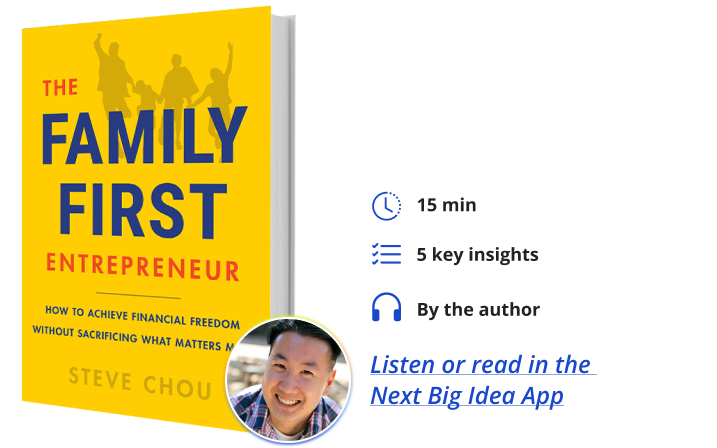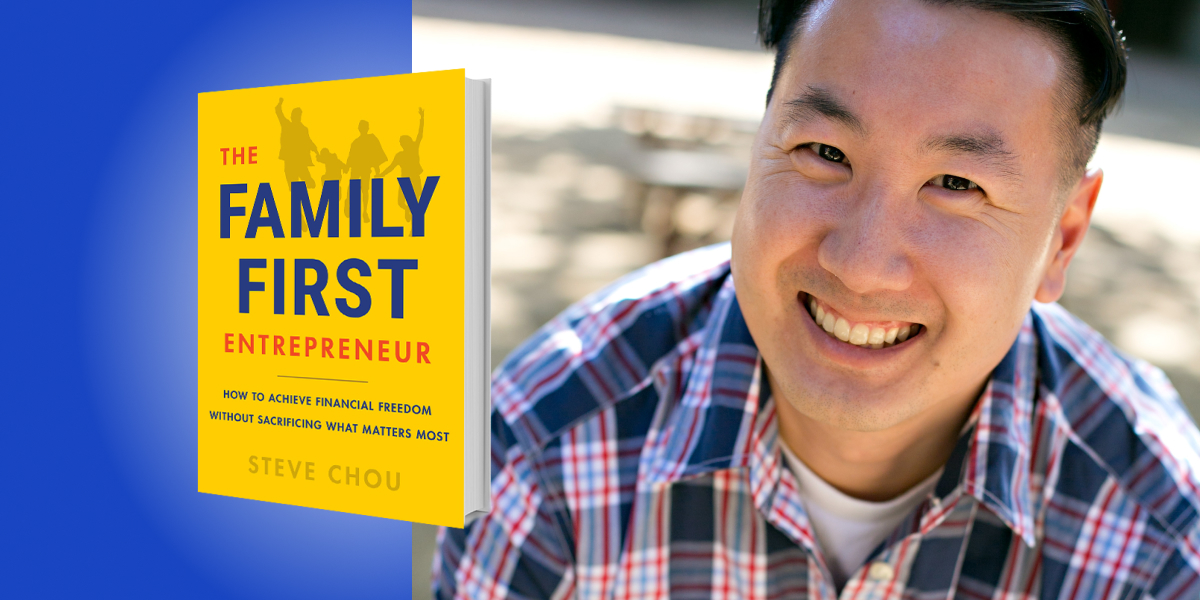Steve Chou runs an educational blog and accompanying podcast for his company, My Wife Quit Her Job. Through it, he teaches about e-commerce based on his experience co-founding Bumblebee Linens with his wife, which allowed him to quit his day job as an engineer. He also co-founded the Sellers Summit, one of the top e-commerce events as noted by Entrepreneur magazine.
Below, Steve shares five key insights from his new book, The Family First Entrepreneur: How to Achieve Financial Freedom Without Sacrificing What Matters Most. Listen to the audio version—read by Steve himself—in the Next Big Idea App.

1. Ninety-nine percent of business advice is wrong.
Most entrepreneurship advice is given by single men who have no responsibilities outside of taking care of themselves. They have no family, no mouths to feed, and no expenses to worry about. That’s not representative of most people.
There’s a popular saying that entrepreneurs prefer to work 80 hours a week to avoid working 40 hours per week at a regular job. But if you follow the path of most entrepreneurs (hustling non-stop), you’ll sacrifice your time and freedom for the promise of riches, work yourself to the bone, and lose the precious time you could have spent with your loved ones.
I’ve interviewed over 450 successful entrepreneurs on my podcast who are absolutely killing it with their multi-million-dollar businesses. But what you never hear about publicly is that they don’t see their family much, or that they are totally burned out and stressed. You don’t hear about the huge sacrifices they had to make. I once interviewed a billionaire whose business destroyed his marriage because he was working too much. To this day, this remains his biggest regret in life, and he would trade all his wealth to be back together with his family.
You can, in fact, be financially free without being a stranger to your kids. You can make good money and have the freedom to enjoy it. There is a sustainable way to achieve financial freedom without making huge sacrifices. It just takes following a certain set of principles to stay on track.
2. Start before you are ready.
Most people wait too long before doing what they know they need to do in life. I wanted to start my blog for years before I actually did. What took so long to get started were two concerns: one, I was intimidated by building my own website on WordPress; and two, I thought I hated writing. So, I kept stalling until finally the pain of not starting was greater than the discomfort of just doing it. I installed WordPress—and it was surprisingly easy! Two years of waiting, and the whole thing took only two hours.
The next day, I typed out my first blog post. It turned out to be much easier than I anticipated, and I could even make it fun. My blog posts didn’t have to be long and eloquent; they just had to be helpful and direct. I’ve blogged regularly ever since then with minimal resistance.
“Many aspiring entrepreneurs delay the first few steps, which are ironically the least risky ones in the whole process.”
When my wife and I started our ecommerce store selling handkerchiefs, we knew nothing about websites, nothing about selling online, and nothing about advertising. But we gave it a shot anyway and made $100,000 in profit in our first year of business with zero experience.
Once we ditched our doubts, progress followed. Lots of things are like that. Most people hesitate to start a business because they doubt that they have marketable skills or think they need to conduct years of research to create a viable business plan. None of this is true. Launching a business is easy. The hard part is getting it to run on autopilot with minimal effort or interference needed from you. Many aspiring entrepreneurs delay the first few steps, which are ironically the least risky ones in the whole process. Nobody is ever truly ready to begin.
After all, you can’t learn how to run a business until you’ve had experience running one. So, if you wait until you’re “ready,” then you will never start at all. You will feel ready to start your business six months after you start it. Even if your business fails, you’ve learned something. That’s not failing; it’s education.
3. Don’t build a business around what you love.
When it comes to business, most people want to sell something they love or provide a service that they are passionate about. But whether you start a business around a passion or not, most of what you end up doing is not related to the thing you sell. Granted, there are exceptions to this rule, but very few. In our case, we sell linens, but most of the daily operations have to do with sales and marketing, tracking inventory, and customer service. We could be selling computers and it would basically be the same list of daily tasks.
Don’t start a business because you’re trying to monetize your passion because you won’t be very happy. You may begin to associate the mundane activities required to run the business with your passion itself and therefore grow to resent it. For example, my wife was passionate about embroidery and loved to embroider blankets and pillowcases. But as soon as we started doing it for other people, she started hating it.
It’s a recipe for unhappiness. If you do find something that you love and turn it into a business—and you’re ready to do the work—great! But don’t believe that this is something you have to be in love with. That’s not true. You can start a business around a lot of different areas of interest and make many of them succeed if you know what to do. You don’t have to be passionate about running a business necessarily. Just know that this is how you end up spending most of your time—doing boring things every business owner has to do.
“It didn’t matter what we sold so long as we fulfilled our primary goal.”
Instead of passion, focus on the purpose of your business. For me, our business was always about making enough money to replace my wife’s income so she could stay at home with the kids. That was the real goal, and every decision we made was oriented around that objective. We passed up a lot of other opportunities that excited me more than handkerchiefs, but that wasn’t the point of what we were doing. The point was: which business would allow us to have the most freedom to do what we wanted? Everything had to pass through that filter. It didn’t matter what we sold so long as we fulfilled our primary goal. That was what we were passionate about—the purpose behind the business, not just the business itself.
4. Everything is a commodity.
When starting a business, most people struggle with what to sell, not because they can’t find a profitable product, but because they want to sell something novel or unique. The truth is that very few products are unique, and almost every product is a commodity. Think of how many successful apparel companies or jewelry companies exist, and you’ll soon realize that nothing is really new. Almost everyone sells the same type of products and services. Instead of killing yourself trying to come up with the next big invention, focus on what Drew Whitman calls the “Life-Force 8.” These are the core human desires that are “responsible for almost all product sales.” The Life-Force 8 are:
- Survival, enjoyment of life, life extension
- Enjoyment of food and beverages
- Freedom from fear and danger
- Sex
- Comfortable living conditions
- Being superior to others (aka winning)
- Care and protection of your loved ones
- Social approval
If you can appeal to a person’s Life-Force 8, you can sell anything. People rarely make purchase decisions rationally. It’s all about feelings. If you can position your product to address sexual urges, elevate status, or keep loved ones safe, you better believe people are going to have strong feelings about it.
Take Dr. Squatch, for example: They sell soap for men, but if you look at their commercials, what they are really selling is sex. Remember those old Herbal Essences commercials where they implied the women washing their hair were having an orgasmic experience—or the Old Spice commercial where the guy getting out of the shower is daring the men watching to be stronger and manlier. These are all appeals to the Life-Force 8, and they work very, very well. Everyone gets hung up on finding a niche, but the product is less important than the emotions you evoke in a customer. Focus on the feelings, and the sales will come.
5. Starting a side hustle is not risky.
The biggest misconception about entrepreneurs is that they are inveterate gamblers. Of the well over 450 successful small business owners I’ve interviewed on my podcast, not one of them has struck me as a big-time risk-taker. Quite the opposite.
I don’t know if the media is to blame or if it’s just a modern misunderstanding about what it takes to succeed, but there seems to be a myth in our culture that successful entrepreneurs enjoy taking wild chances, that they are “high rollers” who go big or go home.
“Successful entrepreneurs take small, calculated risks.”
Almost every entrepreneur I’ve met in the past ten years has taken a methodical and conservative approach to starting their businesses. As a result, most of them have succeeded. Successful entrepreneurs take small, calculated risks. They don’t bet the farm, which gives them room for little mistakes. Then they iterate.
When my wife and I started our business, we both worked full-time jobs while building an e-commerce store on the side. We only invested $630 to start our business. We made small bets as we went, making little tweaks with each step, and learning along the way. Our success is not a result of any brilliance on our part, just a willingness to keep experimenting and not going “all in” too soon.
It took a while, but our store now makes over a million dollars a year. My wife and I no longer work regular jobs and we spend most of our time with family—not on the beach, sipping margaritas, but with our kids, creating meaningful experiences.
Starting a side hustle doesn’t have to be risky. Entrepreneurship doesn’t have to be “all or nothing.” It can be a slow and steady process of taking risks, yes, but not ones that will financially devastate you if something goes sideways.
If you decide to take the plunge into business ownership, I applaud you. It’s not for everyone, but the rewards can far outweigh the risks if you do it right. Just make sure you have a backup plan. Stay at your day job until your side hustle can support you. Then, build upon your existing successes until you have a portfolio of income streams.
To listen to the audio version read by author Steve Chou, download the Next Big Idea App today:
































